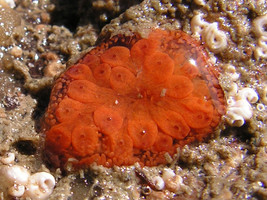Urochordata
Tunicates



This tree diagram shows the relationships between several groups of organisms.
The root of the current tree connects the organisms featured in this tree to their containing group and the rest of the Tree of Life. The basal branching point in the tree represents the ancestor of the other groups in the tree. This ancestor diversified over time into several descendent subgroups, which are represented as internal nodes and terminal taxa to the right.

You can click on the root to travel down the Tree of Life all the way to the root of all Life, and you can click on the names of descendent subgroups to travel up the Tree of Life all the way to individual species.
For more information on ToL tree formatting, please see Interpreting the Tree or Classification. To learn more about phylogenetic trees, please visit our Phylogenetic Biology pages.
close boxReferences
McHenry, M. J. and S. N. Patek. 2004. The evolution of larval morphology and swimming performance in Ascidians. Evolution 58(6):1209-1224.
Sawada, H., H. Yokosawa and C. Lambert, eds. 2001. The Biology of Ascidians. Springer Verlag, Tokyo.
Stach, T. and J. M. Turbeville. 2002. Phylogeny of Tunicata inferred from molecular and morphological characters. Molecular Phylogenetics and Evolution 25(3):408-428.
Swalla, B.J., C.B. Cameron, L.S. Corley, and J.R. Garey. 2000. Urochordates are monophyletic within the deuterostomes. Systematic Biology 49:122-134.
Turon, X. and S. Lopez-Legentil. 2004. Ascidian molecular phylogeny inferred from mtDNA data with emphasis on the Aplousobranchiata. Molecular Phylogenetics and Evolution 33(2):309-320.
Yokobori, S., A. Kurabayashi, B. A. Neilan, T. Maruyama, and E. Hirose. 2006. Multiple origins of the ascidian-Prochloron symbiosis: Molecular phylogeny of photosymbiotic and non-symbiotic colonial ascidians inferred from 18S rDNA sequences. Molecular Phylogenetics and Evolution 40(1):8-19.
Yokobori, S., T. Oshima, and H. Wada. 2005. Complete nucleotide sequence of the mitochondrial genome of Doliolum nationalis with implications for evolution of urochordates. Molecular Phylogenetics and Evolution 34(2):273-283.
Title Illustrations

| Scientific Name | Botryllus schlosseri |
|---|---|
| Location | Normandie (FRANCE) |
| Specimen Condition | Live Specimen |
| Image Use |
 This media file is licensed under the Creative Commons Attribution-ShareAlike License - Version 3.0. This media file is licensed under the Creative Commons Attribution-ShareAlike License - Version 3.0.
|
| Copyright |
©
Vincent GARIBAL

|
| Scientific Name | Jasis zonaria |
|---|---|
| Location | Madeira |
| Specimen Condition | Live Specimen |
| Identified By | Rob van Soest (from photo) |
| Copyright |
© Peter Wirtz

|
| Scientific Name | Pyrosoma atlanticum |
|---|---|
| Location | Madeira |
| Specimen Condition | Live Specimen |
| Identified By | Rob van Soest (from photo) |
| Copyright |
© Peter Wirtz

|
About This Page
Page copyright © 2008
All Rights Reserved.
- First online 10 January 2008
- Content changed 10 January 2008
Citing this page:
Tree of Life Web Project. 2008. Urochordata. Tunicates. Version 10 January 2008 (temporary). http://tolweb.org/Urochordata/14821/2008.01.10 in The Tree of Life Web Project, http://tolweb.org/







 Go to quick links
Go to quick search
Go to navigation for this section of the ToL site
Go to detailed links for the ToL site
Go to quick links
Go to quick search
Go to navigation for this section of the ToL site
Go to detailed links for the ToL site